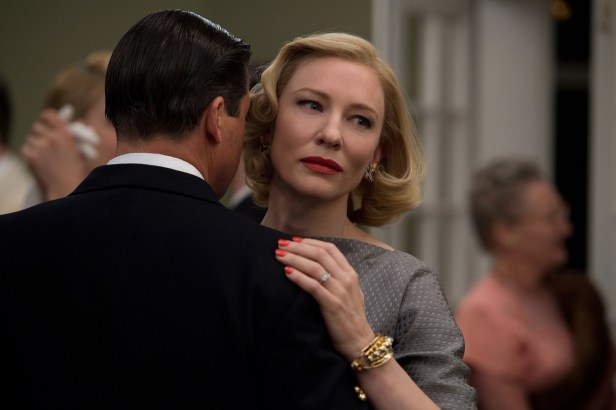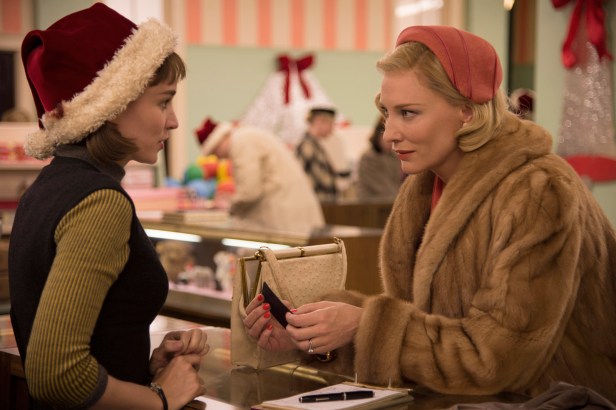Carol (2015)
Some people change your life forever
I’m probably in the minority here, so without sounding too brutish, I have to admit that I was expecting a little more from director Todd Haynes’ faithful adaptation of Patricia Highsmith’s 1952 novel, The Price of Salt, which was published under the pseudonym of Claire Morgan, seeing as Patricia’s mother disapproved of her daughter’s sexual preference towards women. In any respect, Carol is an easy film to like — a delicately shot picture based on a groundbreaking work of fiction — yet, it’s a completely dry experience, seeing as its central romance relies heavily on drawn out looks from its leading ladies, who are trying desperately hard to convey real emotion.

Set in New York during the 1950s, Carol follows the forbidden romance between a well-to-do suburban housewife and devoted mother, Carol Aird (Cate Blanchett), and a younger department store clerk and aspiring photographer Therese Belivet (Rooney Mara). The pair meet (and are immediately drawn to one another) after Carol enters a Manhattan department store in search of a Christmas present for her daughter Rindy (Sadie Heim), spotting Therese working behind the counter as a salesgirl. Carol is in search of a particular doll, which happens to have sold out, so Therese recommends a train set, and voilà — it’s love at choo choo! Anyway, Carol purchases the train set (which is a little odd seeing as her daughter wanted a doll for Christmas but is getting something entirely different instead), and leaves her expensive gloves at the counter. After some oohing and ahhing, Therese mails the mittens back to Carol, and as a thank-you, gets invited over to Carol’s trendy New Jersey home where she witnesses Carol and her husband Harge (Kyle Chandler) bicker with one another, which deepens the women’s connection.
Within its first hour or so, things get somewhat tiresome with actions accounting for words (Therese caresses Carol’s gloves for instance) whilst lingering stares and long glances are used to suggest the ladies’ increasing attraction towards one another, their unspoken bond becoming a tad frustrating. I understand that filmmaker Haynes, I’m Not There (2007), is trying to highlight the way in which gays and lesbians were secretly forced to express themselves back in that era, but we’re in 2015 now and this language, at times, can feel a little dull or monotonous. Things pick up when Carol’s divorce gets nasty and Harge decides to sue for full custody of Rindy based on a ‘morality clause’ that threatens to expose Carol’s attraction towards women. In order to get away from the stress of the separation, Carol asks Therese to accompany her on a cross-country road trip to Chicago, traveling along the West coast in her grey Packard.

When the women do eventually acknowledge their yearning for one another and physical attraction, it’s totally shrug worthy, seeing as the pair share little sexual chemistry or playfulness, not to mention a lack of below-the-waist action — I honestly felt no emotional union between the contrasting leads whatsoever. Furthermore, Blanchett’s golden-haired socialite is a little too stagy and exaggerated when compared to Mara’s gamine Therese, with Carol constantly flouncing about in expensive garments and glamorous coats, even when she’s supposedly living out of a suitcase.
Where this lesbian melodrama really shines is in its ‘50s period visual style, which has been meticulously recreated by the flick’s first-rate production design — our stars are frequently seen prancing around in an array of gorgeous hats, furs and get-ups that have been carefully crafted by legendary costume designer and multiple Academy Award winner Sandy Powell, The Departed (2006), while the gorgeous cinematography by Edward Lachman, Erin Brockovich (2000) — inspired by the photography of Vivian Maier and Saul Leiter — seamlessly captures a distinct aristocratic grace and elegance that complements the flick’s overall narrative. Together with a swoony score composed by Carter Burwell, Legend (2015), Carol looks and sounds terrific.
On the performance front, Cate Blanchett, being one the finest actresses working today, does a solid job in the titular role; even if I believe her work in James Vanderbilt’s Truth (2015) was far superior. Rooney Mara, The Social Network (2010), sharing a striking resemblance to the late Jean Simmons, is also decent here, playing Therese Belivet, the young lonely photographer who falls for Carol’s chic charms — granted Mara’s character is basically reduced to a number of blank glazes. Buffalo born actor Kyle Chandler, The Wolf of Wall Street (2013), is given a stock villain role as Carol’s bitter husband Harge, a guy who’d do anything and everything just to deny Carol visitation rights to her daughter, while Jake Lacy, Obvious Child (2014), does an excellent job in his smaller role as Richard Semco, Therese’s boyfriend — a scene where Richard expresses his feelings towards Therese’s growing friendship with Carol is a real high point.

Working from a screenplay by Phyllis Nagy, Carol lacks the source’s distinctive intimacy. Those familiar with the novel know that the writing is framed through Therese’s point of view, allowing readers to get into her inner psyche, understanding her isolation, reservations and desires, which ultimately lead to her sexual awakening. In the film, however, Therese has no psychological heft, with her headspace never explored; she’s just a passive player whom I cared very little about. In addition Todd Haynes’ direction is slow and formalized, there are lots of lingering, carefully framed shots and close-ups; oddly enough the picture’s most effective scenes are those focused around Rindy’s custody battle and Therese’s beau opposed to the women’s homosexual relationship.
At the end of the day Carol is not the sensational knockout that attendees at this year’s Cannes Film Festival would have you believe. Yes, the picture supplies a lot of fodder for the Oscars cannon, its competently shot and adeptly performed, I just wish the film were that bit more engrossing, as it ultimately left me feeling impartial and kinda detached.
3 / 5 – Good
Reviewed by Mr. Movie
Carol is released through Transmission Films Australia
I’m so glad to see that someone else wasn’t blown away by Carol, as the whole world seems to be. Great review!
Yeah, I liked it, didn’t LOVE it. The performances were solid, but I just felt that the whole flick was kinda slow.